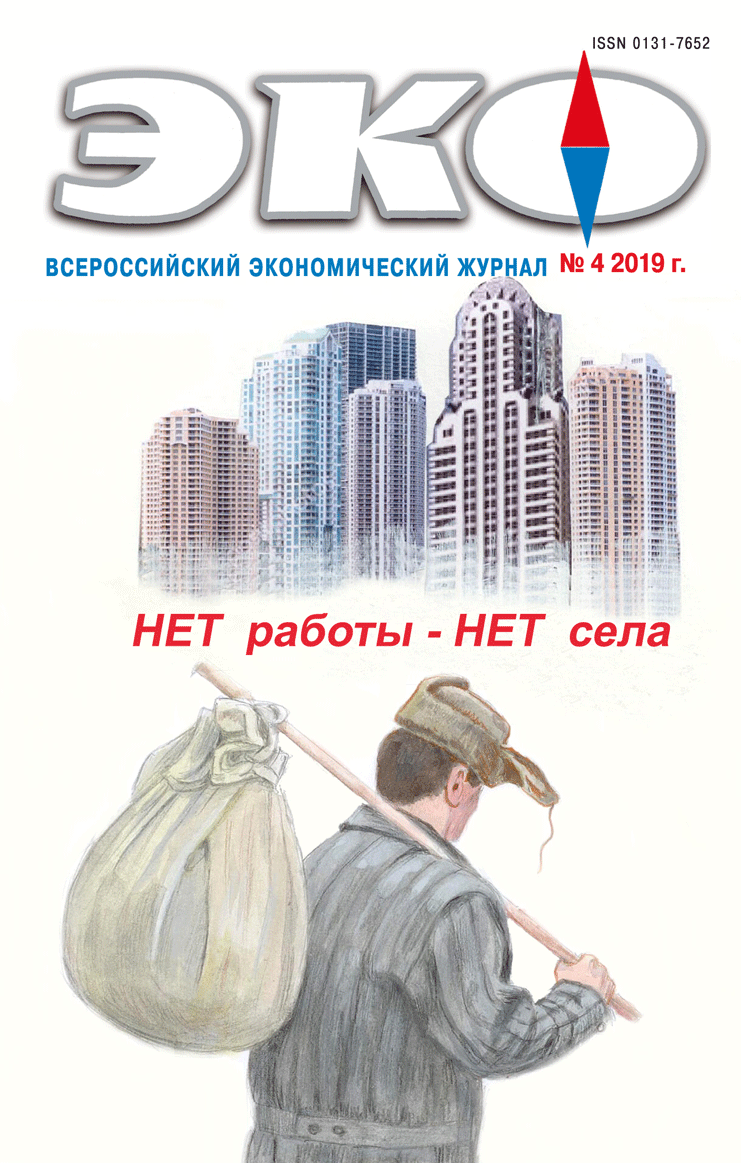ТЕМА НОМЕРА: НЕТ РАБОТЫ - НЕТ СЕЛА
Published 2019-03-29
Keywords
- Local government,
- rural settlements,
- self-organization,
- rural development,
- local communities
- regions of Siberia ...More
How to Cite
1.
Fadeeva О. Siberian Village: from Formal Self-Government to Forced Self-Organization. ECO [Internet]. 2019 Mar. 29 [cited 2026 Feb. 2];49(4):71-94. Available from: https://ecotrends.ru/index.php/eco/article/view/3637
Abstract
The article reviews the evolution of the system of rural self-government in Russia over the last 15 years. Following adoption in 2003 of the relevant federal law, the active institutional design of local self-government was replaced by a tendency to restrict the powers and autonomy of the municipalities – and, first of all, at the level of rural settlements closest to the population. Reduced financing of local budgets became a major factor in restricting rural development. The local self-government got introduced to the system of government as the lowest, most dependent and resource-limited level of the power hierarchy. In her field study, the author conducted interviews with heads of rural settlement administrations in Siberian regions that formed a “from bottom” view on the ongoing transformations to help understand the reaction of rural communities to changes in the external institutional environment. It is shown that the answer to the reform challenges is development of informal practices that facilitate self-organization of the population, which serves as a kind of compensatory mechanism. In such a system, the role of the heads of rural administrations considerably increases as they have to initiate and organize projects demanding complicity and solidarity of inhabitants in order to resolve common tasks.References
- Бялкина Т. М. Новая муниципальная реформа: изменение подходов к правовому регулированию компетенции местного самоуправления // Актуальные проблемы российского права. 2014. № 8 (45). С. 1609–1614.
- Дворядкина Е. Б., Беликова О. А., Арагилян И. В. Бюджеты сельских территорий в структуре региональных финансово-бюджетных подсистем // Аграрный вестник Урала. 2015. № 3 (133). С. 48–53.
- Дворядкина Е. Б. Тенденции формирования местных бюджетов сельских территорий // Вестник Курганской ГСХА. 2017. № 2 (22). С. 6–10.
- Копотева И. В. Гражданское общество и гражданская активность сельской России // Крестьяноведение. 2016. Т. 1. № 1. С. 142–166.
- Лимонов А. М., Хазов Е. Н. Вопросы перераспределения полномочий между органами местного самоуправления и органами государственной власти субъекта Российской Федерации: проблемы теории и практики // Вестник Московского университета МВД России. 2016. № 5. С. 121–125.
- Маркварт Э. Э. Российское местное самоуправление перед главными вызовами современности // Российский экономический журнал. 2016. № 6. С. 3–17.
- Моляренко О. А. Теневое государственное и муниципальное управление // Мониторинг общественного мнения: экономические и социальные перемены. 2016. № 3. С. 120–133.
- Папело В. Н., Подхватилина М. Д., Зубцова Н. К. Инициативное бюджетирование: проблемы реализации на уровне сельских поселений (на примере Криводановского сельсовета Новосибирского района Новосибирской области) // Развитие территорий. 2017. № 3 (9). С. 34–38.
- Савченко Е. С., Никулин А. М. Мы всю жизнь – первопроходцы // Крестьяноведение. 2018. Т. 3. № 2. С. 127–154.
- Сумская Т. В. Местное самоуправление: эволюция бюджетной политики / Ред. С. А. Суспицын. Новосибирск: Изд-во ИЭОПП СО РАН, 2016. 212 с.
- Фадеева О. П. Оскудеет ли сибирская нива? // ЭКО. 2018. № 12. С. 143–162.
- Фадеева О. П. Реалии сельского самоуправления: реформы и их последствия // Регион: экономика и социология. 2016. № 4. С. 267–289.
- Фадеева О. П., Нефёдкин В. И. Вертикали и горизонтали сельского Татарстана // ЭКО. 2018. № 1. С. 101–118.

